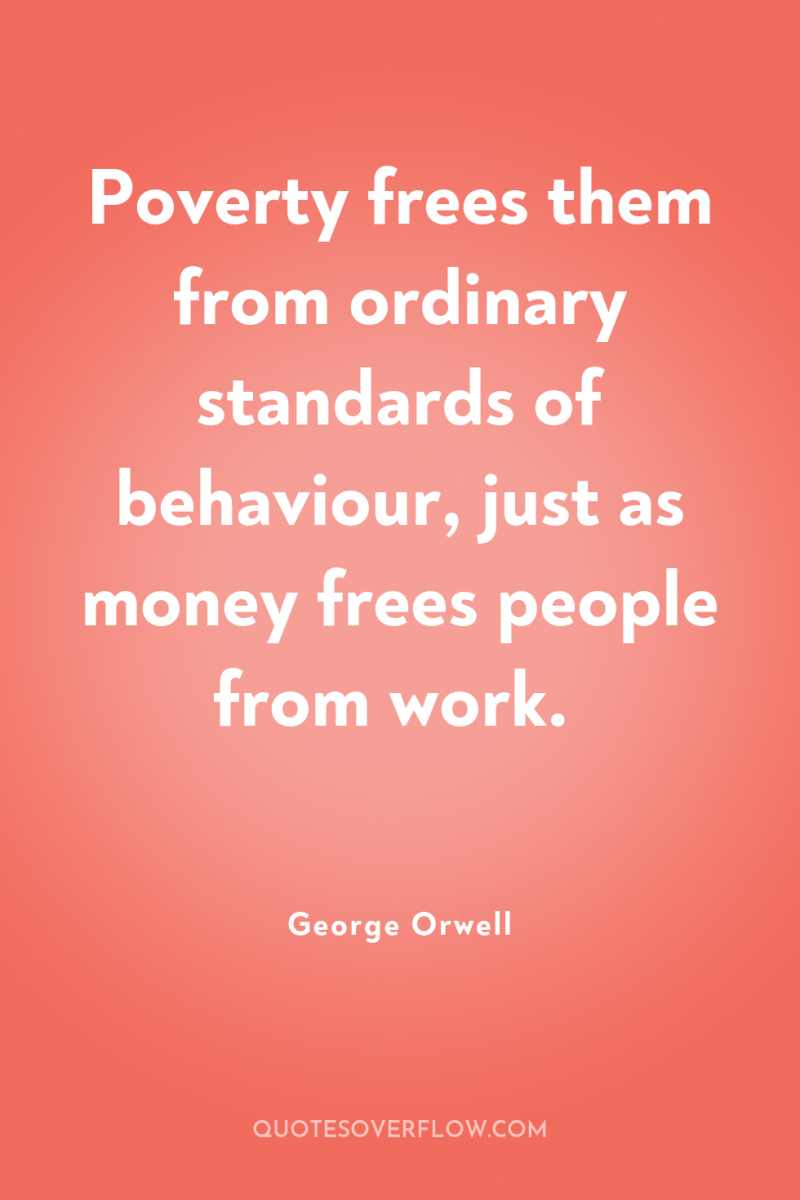1
You don't want to have any pity on these here tramps — scum, they are. You don't want to judge them by the same standards as men like you and me. They're scum, just scum.' It was interesting to see the subtle way in which he disassociated himself from 'these here tramps'. He had been on the road six months, but in the sight of God, he seemed to imply, he was not a tramp. I imagine there are quite a lot of tramps who thank God they are not tramps. They are like the trippers who say such cutting things about trippers.George Orwell

2
Poverty frees them from ordinary standards of behaviour, just as money frees people from work.George Orwell
3
Is a PLONGEUR'S work really necessary to civilization? We have a feeling that it must be 'honest' work, because it is hard and disagreeable, and we have made a sort of fetish of manual work. We see a man cutting down a tree, and we make sure that he is filling a social need, just because he uses his muscles; it does not occur to us that he may only be cutting down a beautiful tree to make room for a hideous statue. I believe it is the same with a PLONGEUR. He earns his bread in the sweat of his brow, but it does not follow that he is doing anything useful; he may be only supplying a luxury which, very often, is no luxury at all. .George Orwell
4
Within certain limits, it is actually true that the less money you have, the less you worry.George Orwell
5
Remember that the bad days are not forever, and the trouble which seems so terrible at last.George Orwell
6
A tramp, therefore, is a celibate from the moment when he takes to the road. He is absolutely without hope of getting a wife, a mistress, or any kind of woman except – very rarely, when he can raise a few shillings – a prostitute. It is obvious what the results of this must be: homosexuality, for instance, and occasional rape cases. But deeper than these there is the degradation worked in a man who knows that he is not even considered fit for marriage. The sexual impulse, not to put it any higher, is a fundamental impulse, and starvation of it can be almost as demoralizing as physical hunger. The evil of poverty is not so much that it makes a man suffer as that it rots him physically and spiritually. And there can be no doubt that sexual starvation contributes to this rotting process. Cut off from the whole race of women, a tramp feels himself degraded to the rank of a cripple or a lunatic. No humiliation could do more damage to a man’s self-respect.George Orwell
7
People are wrong when they think that an unemployed man only worries about losing his wages; on the contrary, an illiterate man, with the work habit in his bones, needs work even more than he needs money. An educated man can put up with enforced idleness, which is one of the worst evils of poverty. But a man like Paddy, with no means of filling up time, is as miserable out of work as a dog on the chain. That is why it is such nonsense to pretend that those who have 'come down in the world' are to be pitied above all others. The man who really merits pity is the man who has been down from the start, and faces poverty with a blank, resourceless mind.George Orwell
8
It is fatal to look hungry. It makes people want to kick you.George Orwell
9
Fear of the mob is a superstitious fear. It is based on the idea that there is some mysterious, fundamental difference between rich and poor, as though they were two different races, like Negroes and white men. But in reality there is no such difference. The mass of the rich and the poor are differentiated by their incomes and nothing else, and the average millionaire is only the average dishwasher dressed in a new suit. Change places, and handy dandy, which is the justice, which is the thief? Everyone who has mixed on equal terms with the poor knows this quite well. But the trouble is that intelligent, cultivated people, the very people who might be expected to have liberal opinions, never do mix with the poor. For what do the majority of educated people know about poverty?.George Orwell
10
The food we were given was no more than eatable, but the patron was not mean about drink; he allowed us two litres of wine a day each, knowing that if a plongeur is not given two litres he will steal three.George Orwell
11
He was an embittered atheist (the sort of atheist who does not so much disbelieve in God as personally dislike Him), and took a sort of pleasure in thinking that human affairs would never improve.George Orwell
12
He was an embittered atheist (the sort of atheist who does not so much disbelieve in God as personally dislike Him)...George Orwell
13
The educated man pictures a horde of submen, wanting only a day's liberty to loot his house, burn his books, and set him to work minding a machine or sweeping out a lavatory. 'Anything, ' he thinks, 'any injustice, sooner than let that mob loose.' He does not see that since there is no difference between the mass of rich and poor, there is no question of setting the mob loose. The mob is in fact loose now, and--in the shape of rich men--is using its power to set up enormous treadmills of boredom, such as 'smart' hotels.George Orwell
14
Be more gay, I beseech you!George Orwell
15
The mass of the rich and the poor are differentiated by their incomes and nothing else, and the average millionaire is only the average dishwasher dressed in a new suit.George Orwell